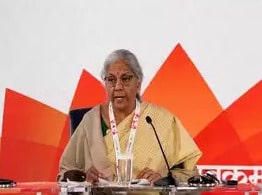
Finance Minister Nirmala Sitharaman has expressed her support for a comprehensive strategy for the reform of multilateral development banks, stating that it is crucial to ensure their continued relevance in the changing global economic landscape.
Speaking at a recent conference on multilateral development banks, Sitharaman emphasized the need for a holistic approach to reform, taking into account the evolving priorities and challenges faced by these institutions.
“Multilateral development banks have played a critical role in financing development projects and promoting economic growth in many countries, including India. However, the world has changed significantly since their establishment, and it is important to ensure that these institutions remain relevant and effective in addressing the emerging needs of the global economy,” Sitharaman said.
She added that multilateral development banks should be encouraged to collaborate and share knowledge and expertise to maximize their impact on sustainable development.
Sitharaman’s remarks come as several multilateral development banks, including the World Bank and the Asian Development Bank, are undergoing a process of reform to enhance their effectiveness and responsiveness to the needs of their member countries.
The World Bank, for instance, has launched a series of reforms aimed at strengthening its governance, improving the quality and impact of its projects, and enhancing its ability to mobilize private sector finance.
Similarly, the Asian Development Bank has embarked on a comprehensive reform agenda, which includes measures to enhance its financial sustainability, strengthen its governance, and improve the quality and relevance of its operations.
Sitharaman acknowledged the importance of these reform efforts but emphasized the need for a more coordinated and strategic approach to reform across multilateral development banks.
“We need to take a holistic view of the reform process, taking into account the priorities and challenges of all multilateral development banks. This requires close collaboration and coordination among these institutions, as well as with their member countries,” she said.
Sitharaman also highlighted the need for multilateral development banks to align their financing and policy advice with the sustainable development goals (SDGs) and climate goals.
“Multilateral development banks have a critical role to play in supporting the achievement of the SDGs and climate goals. They should prioritize financing and policy advice that promotes inclusive and sustainable growth, while reducing carbon emissions and strengthening climate resilience,” she said.
She added that India, which is one of the largest recipients of multilateral development bank financing, is committed to working with these institutions to promote sustainable development and climate action.
The Finance Minister’s remarks have been welcomed by experts in the development finance community, who have long called for a more coordinated and strategic approach to multilateral development bank reform.
“FM Sitharaman’s call for a holistic approach to multilateral development bank reform is timely and important. As the world faces increasingly complex and interrelated challenges, it is essential that these institutions work together to maximize their impact and effectiveness,” said Pradeep Mehta, Secretary-General of CUTS International, a leading public policy think tank.
Mehta added that a coordinated and strategic approach to reform could also help multilateral development banks to mobilize more private sector finance, which is critical to meeting the funding needs of sustainable development.
Sitharaman’s remarks come as India prepares to host the next summit of the BRICS group of emerging economies, which includes Brazil, Russia, India, China, and South Africa. Multilateral development bank reform is expected to be high on the agenda of the summit, which is scheduled to take place in New Delhi later this year.
The Finance Minister’s call for a comprehensive strategy for multilateral development bank reform is likely to provide an impetus for closer cooperation and collaboration among these institutions, as well as with their member countries. It could also help to accelerate progress towards achieving the SDGs and climate goals, which are critical to ensuring a sustainable and inclusive future for all.









